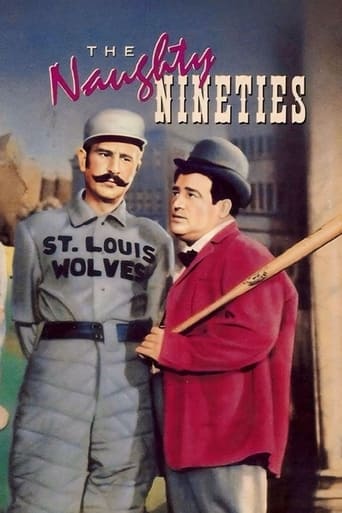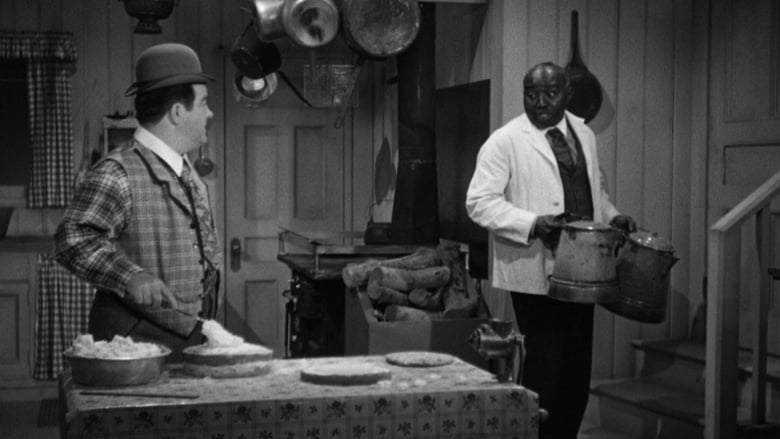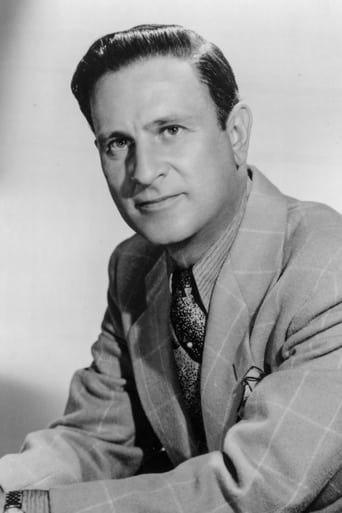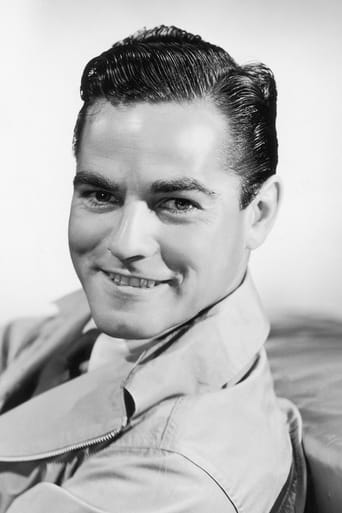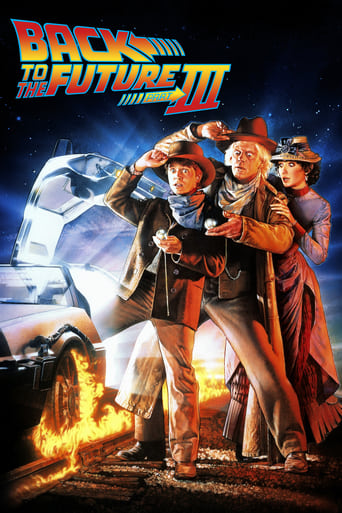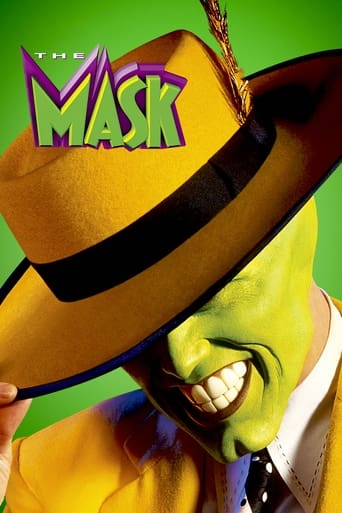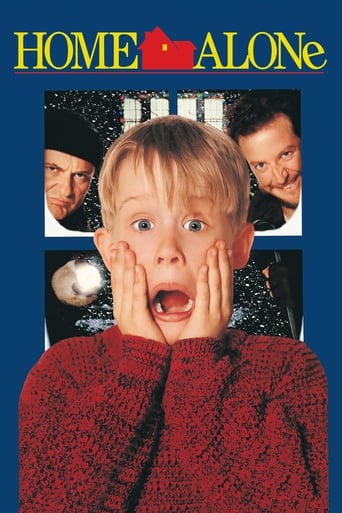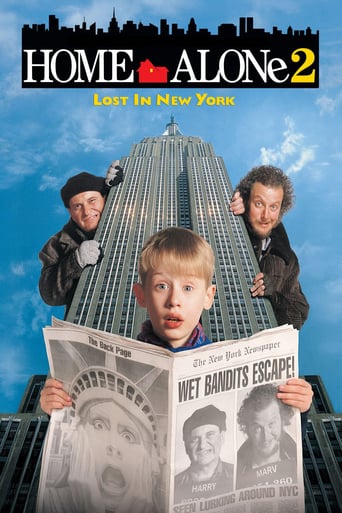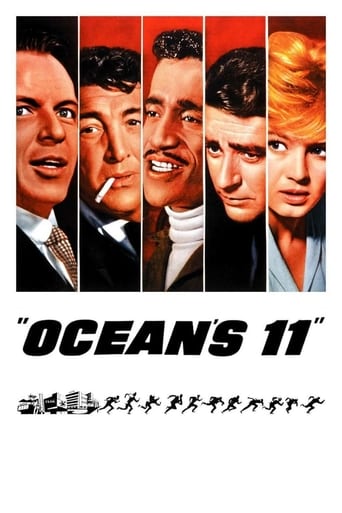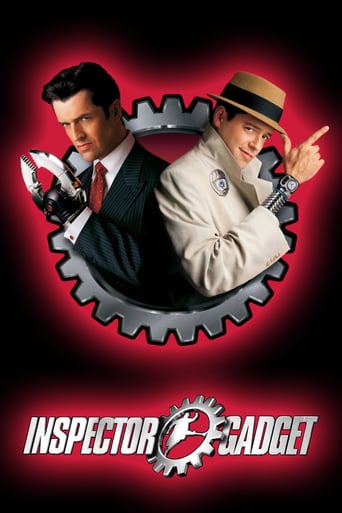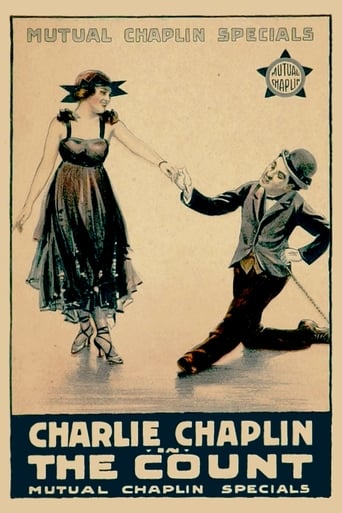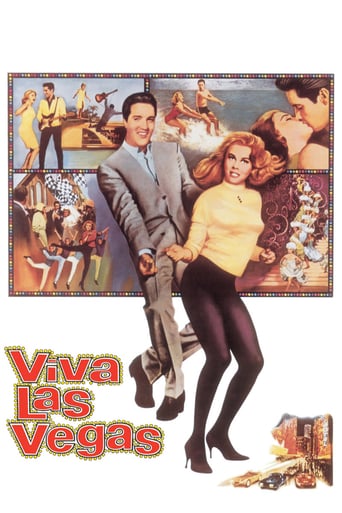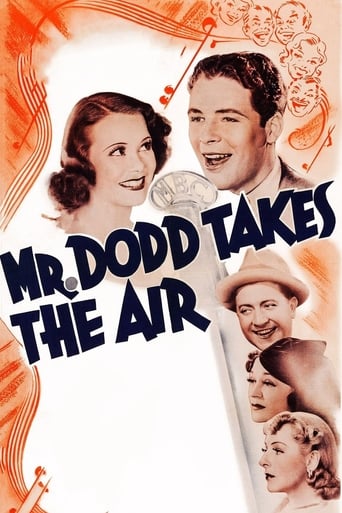The Naughty Nineties (1945)
In the gay '90s, cardsharps take over a Mississippi riverboat from a kindly captain. Their first act is to change the showboat into a floating gambling house. A ham actor and his bumbling sidekick try to devise a way to help the captain regain ownership of the vessel.
Watch Trailer
Free Trial Channels
Cast
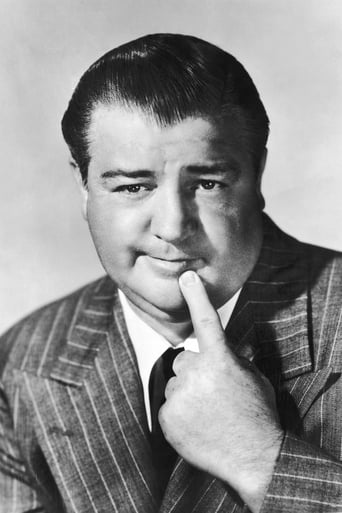


Similar titles
Reviews
You won't be disappointed!
Strong and Moving!
This is a tender, generous movie that likes its characters and presents them as real people, full of flaws and strengths.
The film's masterful storytelling did its job. The message was clear. No need to overdo.
This 1945 Abbott and Costello musical comedy has them doing a 'period' plot, supposedly in the 1890s. Also often labeled the 'gay' nineties, there are a fair number of brief 'show' segments, which work right into the story. A&C begin as actor and roustabout, respectively, for the River Queen: a Mississippi River showboat, later turned into a floating casino by its new majority owners. Incidentally, the historic River Queen of this era never plied the Mississippi, but was used for coastal and river transport on the East Coast. Rita Johnson, as Bonita, plays the 'bad' girl, who has her henchmen, Joe Sawyer, as Baily, and Alan Curtis, as Crawford, help her engage in crooked, when ever possible, gambling activities. By winning 3/4 interest in the River Queen from an inebriated Captain Sam(Henry Travers), the 'gang of 3' turns the River Queen from a showboat into a casino, with most games fixed in favor of the house. Her ambition is to build a lavish show place and casino in New Orleans, using profits from the River Queen to finance such. Toward this end, she offers the Captain $5000. for the remaining 1/4 share in the boat, but the Captain refuses. He suggests they play one open game of poker, winner take all. Amazingly, Bonita agrees, although, with even odds, she stands to lose much more than the Captain. Lois Collier, as Caroline: daughter of Captain Sam, is the 'good' girl. She's the main songbird for the Captain's shows, sing(dubbed) the classic "On a Sunday Afternoon", and the newly composed "I Can't Get You Out of my Mind". Toward the end of the film, surprisingly, she begins to get friendly with Crawford( Alan Curtis): one of Bonita's henchmen, who claims he only teamed up with Bonita because he owed her gambling debts. I noticed that he wasn't involved in chasing A&C after Captain Sam won his boat back, and it was only Baily and Bonita who left town in a buggy. However, there were no further positive indications of a Crawford & Caroline romance.A&C are up to their usual antics. They do a longer version of 'Who's on first' than the version they did in their 1940 film "One Night in the Tropics". Actually, I thought is was too long, with too much repetition. Hence, I continue to prefer their 1940 version....Lou also repeats his 'poisoned wine' sketch he did in "Pardon my Sarong", with bad girl Bonita putting some questionable pill in his wine, thinking he didn't see. He switches the glasses after distracting her attention, but she sees it. This goes back and both several times. The sketch ends differently than the first time....In the finale "Uncle Tom's Cabin", Lou plays an angel. When he is raised, the too thin rope breaks and he goes through the too flimsy floor. This is reminiscent of a similar fall through the floor in "Who Done It?" A&C try gambling to win back some money for Captain Sam. However, the ball keeps coming out of their slot, careening crazily, with the wheel stopped. They then try shooting dice, with Lou under the table with a huge magnet that causes the 'loaded' dice to turn over until they add to 7.Lou engages in the 'fake mirror' sketch, where he's on the opposite side of s window his victim thinks is a mirror, and mimics their actions. Actually, this is clearly the poorest example of this trick I've seen. For much more convincing examples, see "The Princess and the Pirate" or "Duck Soup".A&C are in a back room, next to the kitchen, when they hear the cooks talking about 'cooking the cat', meaning catfish. But there are several kitty cats around, and Lou thinks they mean one of them. Every time he reluctantly pokes his meat with his fork, he hears a cat scream. Also, when he pours his milk onto his dish, it's immediately absorbed by the meat, with the slurping sound. When he strokes the meat it purrs. Abbott experiences no such spooky reactions. Then, Lou is on stage, practicing his singing of "My Bonnie Lies Over the Ocean", reading from sheet music. Meanwhile, Abbott is behind him, directing the placement of a backdrop. He keeps saying "higher, higher", and Lou sings in higher and higher keys. When Abbott says farther to the front, Lou falls off the stage.There are further sketches and other comedy. Many of these routines are pasted onto the plot, but that's OK. With the reservations I mentioned, I recommend this film for those who like A&C shtick.
In the 1890s, Bud Abbott and Lou Costello (as Dexter Broadhurst and Sebastian Dinwiddle) are entertainers on a Mississippi River showboat. The captain of "The River Queen" Henry Travers (as Sam Jackson) loses a percentage of his ownership to some unscrupulous gamblers. So, Abbott and Costello lend him their comic hands. Considering the money they were making for Universal, this is a surprisingly slipshod production for the comedy duo. It consists of haphazard routines, tossed in with an irrelevant plot and an ending chase scene. Marx Brothers bits, and even Buster Keaton's "House Falling" scene, are tossed into the mix. The deservedly famous "Who's on First?" stand-up is cheaply dressed; this is not, as touted, their best version of the routine. But, the "Cat Eating" is very well done; helping make the total package medium, if not rare.***** The Naughty Nineties (6/20/45) Jean Yarbrough ~ Lou Costello, Bud Abbott, Alan Curtis, Rita Johnson
Considering that the previous film, HERE COME THE CO-EDS was such a bad film, THE NAUGHTY NINETIES couldn't help but look good. Overall, NAUGHTY is a mixed bag--with some good Abbott and Costello routines and some bad. In addition, Universal still insists on following a formula they've used in all but one of their previous films--a bunch of sons and a romantic subplot that has nothing to do with Abbott and Costello. Oddly, when the studio dropped both these conventions in WHO DONE IT, the film was a huge success--more than previous films. Why they went back to this material that distracts from the comedy is beyond me.The film finds Bud and Lou on a riverboat (similar to the one in SHOWBOAT) circa 1890. Bud is an actor (and does a decent job when his routines aren't being ruined by Lou) and Lou is, well, Lou--bumbling about on the ship. A group of crooked gamblers get the ship's captain (Henry Travers) drunk and cheat him out of control of his showboat. As a result, they bring crooked gambling and violence to what had been a family-friendly ship. So, naturally, Bud and Lou try to help out--with very mixed results until the end of the film.Along the way are a bunch of vaudeville-style routines. On the plus side, you get to see the best filmed version of their classic "Who's on First" routine (an abbreviated one was in their first film, ONE NIGHT IN THE TROPICS). Also, some of Lou's antics that ruin Bud's acting are kind of funny. On the negative side, Universal Pictures really didn't care if any of the routines looked crappy--using very, very fake-looking props and putting little care into the execution of several routines. In the fishing scene, these are the least realistic fish in the history of film. It serves to make the routine look amazingly dumb. In the catfish scene (where Lou thinks he's being served cat), which could have been very funny, there was absolutely no subtlety in its execution...none. In many ways, this stuff looked like Three Stooges routines--but perhaps done with even less subtlety.Overall, a very mixed bag. For fans of the team, they'll enjoy it. For non-fans, I can't see why this film alone would convert you an Abbott and Costello fan.
THE NAUGHTY NINETIES is one of those films of Abbott & Costello that is a favorite with their fans for the skits that are in them: the plot about the trio of gamblers plotting to take the showboat away from good old Captain Sam (Henry Travers) is tolerable, because it can be ignored. We like the old Captain, but we await the sketches involving the boys. In the end they help save the Captain, so they do become his pair of guardian angels - his "Clarences", if you will.But the sketches are priceless, in particular the rehearsal sketch and the immortal WHO'S ON FIRST.In another review I compared Bud and Lou with Stan Laurel and Oliver Hardy. Bud Abbott's persona is not like Oliver Hardy's, although both try to dominate (Bud, with more success) Lou and Stan. Ollie is quite self-important, but is (actually) as stupid as Stan is. His self-delusion is just added on the cake. But Bud normally is street smarter, and bullies Lou. He barks orders left and right to him, orders that Lou thinks he understands. The orders are in abbreviated form, using slang or short form descriptions that most people will understand, and that is doomed to confuse Lou.In the rehearsal sketch, Lou is studying a song he wants to sing in the showboat show, and if he does it well Captain Sam will let him sing it. Bud is on stage helping direct the putting up of varying scenery. He is asked for help by Lou to help him, and to shut the little guy up, he half-heartedly agrees to do so. But he is concentrating on that scenery. So we hear Lou start singing "MY BONNIE LIES OVER THE OCEAN", and after awhile he hears Bud yelling "Higher", "HIGHER", "LOWER, etc. Of course Lou is not watching Bud directing the men with the scenery, and Lou raises and lowers his voice accordingly. The vast alterations eventually is too much for Lou, who falls into the orchestra pit while an oblivious Bud walks off stage.The other sequence is even greater. If you say "Abbott & Costello" to anyone today, the phrase "Who's on First" comes up immediately. No other dialog of theirs is as memorable (not even that delectable skit about Niagara Falls). Indeed, due to the popularity of Baseball, the skit is honored in Cooperstown's Baseball Hall of Fame, and Bud and Lou are members of the Hall of Fame too (without being baseball players). No other comedy team approached such a signature dialog - for instance Groucho and Chico Marx did several fractured English discussions, such as "Why a Duck" in COCONUTS, but the dialog is not central to their reputations. Similarly Laurel & Hardy's use of "two peas in a pod" in THE SONS OF THE DESERT is classic, but not central to their reputation."Who's On First" works on the same principle as the rehearsal skit - Lou cannot follow the statements fed him by Bud, and yet Bud is not being intentionally difficult. He starts by explaining the crazy nicknames of the baseball players these days, and Lou never makes the logical connection that the nicknames can be terms like "who", "what", "I don't know", and "I don't care". Once I saw someone rewrite Abbott's description as "Mr. Who is on First base; Mr. What is on Second Base...etc." Actually the effect on Lou would probably be minimal: How many people have surnames like "Who" (this was years before the British Doctor in the futuristic tardis showed up). Moreover, they are nicknames, not proper names like "Unconditional Surrender" Grant, or "Old Hickory" Jackson. So it can't be "Mr. Who" or "Mr. I Don't Care".Interestingly few people seem to be noting that the nicknames don't say much for these players. "Who", "What", "I Don't Know", "I Don't Care", "Today", "Tomorrow" suggests that each of the players has a failing, like "Who" suggests he is confused at the strategy of the team (who is going to be targeted by his team's pitcher on the opposite team), "What" suggests a lack of understanding orders from the team coach or captain, "I Don't Know" suggests confusion, and "I Don't care (the short stop) doesn't give a damn to be on the scene of where the ball falls when he is needed. Lou's willingness to play on the team, which we accept as his fondness of the game (and his constant image of being childlike) may actually have some merit - he may be a better player than these others.The highpoint (to me) of the dialog is when, giving up momentarily, trying to comprehend Bud's apparent double-talk, Lou shows he can repeat the line-up's name, and describe a baseball play perfectly. Bud shows his approval of this rational approach - only to hear Lou scream out he doesn't understand what he himself has been talking about. To me that was the perfect conclusion of the great confusion known as "Who's on First".In recent years stores have offered mechanical representations of political and entertainment figures reciting comments they are supposed to be famous for. There was one pair together: of Bud and Lou in costume from THE NAUGHTY NINETIES (Bud wearing the baseball outfit of non-existent St. Louis Wolves), reciting Who's On First. That is immortality folks.

